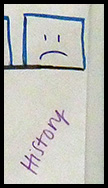Alejandro Zambra, 2014
translation: Megan McDowell, 2016
the forty-third book in the visitor recommendation series;
suggested by Katherine Morayati
The gimmick here is that the book takes the form of the verbal section of the Prueba de Aptitud Académica, the college entrance exam used in Chile back when the author was in high school. It is thus an anthology of short stories, accompanied by commentary in the form of reading comp questions, along with vocab problems that constitute an odd form of poetry. Since I have spent sizeable chunks of my life not only teaching students how to take college entrance exams but also writing verbal sections for practice tests, it was interesting to see a literary work unfold on such unusual yet intimately familiar terrain. However, the constricted format means that there isn’t much room for any of these stories to get very far off the ground. It’s more of an Oulipo-type experiment than a serious opus. (I was actually surprised to discover that the person who recommended it was not Nick Montfort.)
Magnus Mills, 2005
the forty-fourth book in the visitor recommendation series;
suggested by Darius Katz
This book adopts a risky strategem that I tend to associate with games from the early years of the annual interactive fiction competition, when authors, knowing that they had a semi-captive audience, would often submit a game that, for the first few turns—or longer!—seemed dull or even bad… and then the twist would kick in, and the judges would see what the game was really about. Explorers of the New Century seems like an thinly veiled account of the race between Amundsen and Scott to reach the South Pole, as the author presents two rival expeditions, one British and one Scandinavian, taking different routes over forbidding terrain to reach an initially unspecified objective. It is, deliberately, pretty dull at first. The mundane details of each expedition are spelled out at some length, seemingly for lack of anything else to talk about, with a lot of anodyne dialogue between polite stiff-upper-lip types talking about supplies, route selection, and extremely minor interpersonal drama. The only reason to keep reading is to learn the answer to the mystery of where they’re going and to see whether there will be a follow-up to the occasional suggestion that things are not entirely as they seem. Then, about two-thirds of the way through the book, the twist is indeed revealed. Is it worth it? Actually, I think so! I’m going to give this one a thumbs-up. It actually does seem like a good candidate to teach at some point down the line, since it’s quite short, and not only would it serve as a good example text in a unit about plotting and elision, but it leaves things open enough that I imagine we could have a pretty lively debate about what exactly has been revealed and what it all means. (It’d also make for a good example when we talk about adapting stories into different media, because this one is pretty much unfilmable!)

Babylon
Paul Kriwaczek, 2012
California’s Utopian Colonies
Robert Hine, 1953
Conquistadores
Fernando Cervantes, 2020
The Great Sea
David Abulafia, 2011
I travel back and forth between the Bay Area and Portland a lot these days, so here are three history books I listened to while driving and one I read on flights. I’m grouping them all together because I don’t really have much to say about them. I like auditing history classes; perhaps the need to develop cohesive 50- or 80-minute lectures to people who are looking right at them makes scholars more inclined to organize their material in terms of points rather than litanies. And I have read (and listened to) good history books: for instance, The Fate of Africa was really compelling. But these four books were just one damn thing after another. Babylon had some interesting passages about daily life in Mesopotamia, and The Great Sea, covering the history of the Mediterranean from prehistory to 2010, is certainly not lacking for grand sweep… but, still, none of these books added nearly as much to my fund of knowledge as auditing a course does. They ended up serving as little more than something to keep my mind occupied during the many hours of cruising through less than spectacular scenery.
 |
 |
 |
 |
||
|---|---|---|---|---|---|
Tumblr |
this site |
Calendar page |
|||

